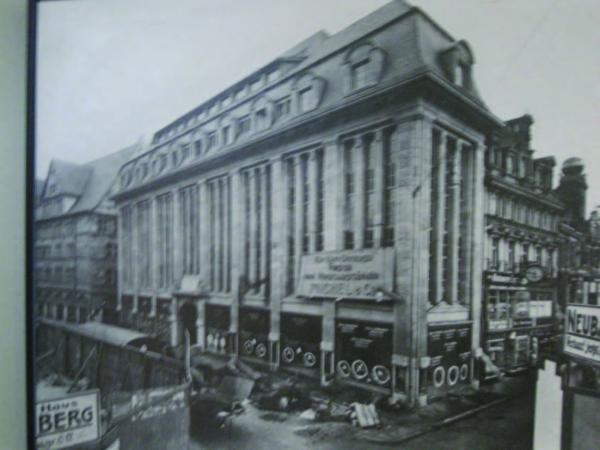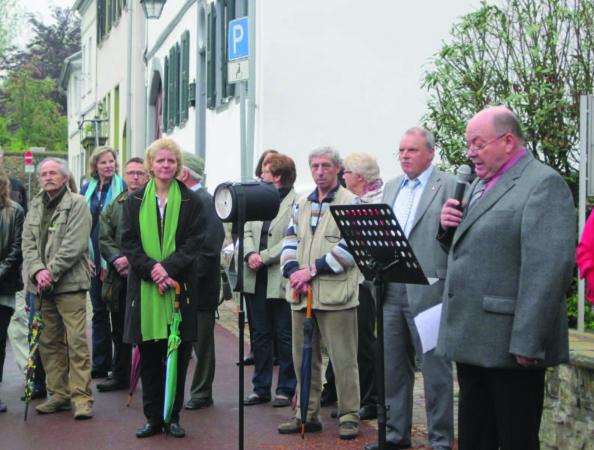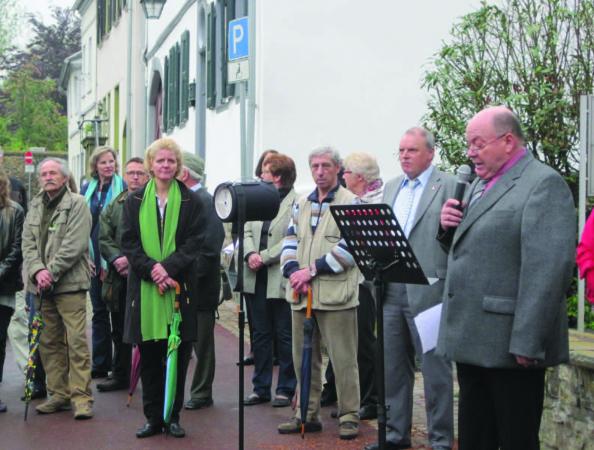Her great grandparents’ home, the family department store, and a ceremony to honor her herouncle — all in a day’s travel for Madeleine Abramson
By Madeleine Abramson
A few months ago, while checking my emails, I was surprised to see a roundrobin message from a cousin in New York to my mother’s entire family inviting us to attend a ceremony in Germany.
My great uncle Jupp Weiss came from a small town near Cologne called Flamersheim, and May 16 was to be the 120th anniversary of his birth. The town had decided to use the day to unveil a sign naming a large new street called Jupp Weiss Strasse. Germany! My mother left Germany in 1933, and when, as a teenager, I had expressed an interest to go, she had been completely horrified. Almost five decades later I can still hear her reaction.
Since then, I had been for one night to Aachen, which I consider barely to be in Germany as it is right on the western border and also known as Aix - la - Chapelle, and it had been while my husband and I were en route to Switzerland. Did I want to go again?
The email gave me a month’s notice and I had back-to-back commitments, although that actual date was free. I used the commitments as an excuse for a few days not to go to Germany, and then suddenly saw that this was ridiculous. If my Aunt Joke, the daughter in law (and stepdaughter) of the man to be honored could go, so could I. She was in Germany most recently in 1945, when she was liberated from Bergen- Belsen. She planned to attend the ceremony — and did — her once condition being that she was driven to and from Holland on the day as she refused to sleep in Germany.
I left home at 5.30am and by midday I was sitting having coffee outside Cologne Cathedral. Relations who traveled for the event included my Israeli second cousins Anat and Atara, and Anat’s daughter Roni.
But what was it all about? Why was Uncle Jupp Weiss being honored?
Last year a German non- Jewish historian and Holocaust specialist, Hans- Dieter Arntz, wrote a German-language book about Weiss. Arntz was very instrumental in getting the local council of name the street, and also to put up a plaque on the house where he was born, and where my greatgrandparents lived.
Arntz explained he was shocked to learn about the history of the war at school given that his parents, who had clearly lived through the experience, never spoke a word about it to him. He has written a whole book on Kristallnacht. He lives in the area where Weiss was born, and seems to have become fascinated with the history of this one man.
In 1935 Weiss moved to Holland. He worked to get Jews out of Germany, but in 1943 got taken to Bergen-Belsen. Weiss was made the Judenältester — “Jewish elder” — at Bergen– Belsen, and unlike some of the ‘elders’ he was neither corrupt nor in the thrall of the SS. He was honest and fair and did his best to get the best living conditions that he could for the camp inmates, who respected him, as did the German authorities.
Our information comes from letters he wrote, his sons, and obituaries written by other prisoners who survived. These latter say that he was constantly trying to improve conditions and rations, lying about the numbers of inmates present to get extra food, and keeping spirits up in various ways, such as helping people celebrate festivals and run Seders. His rigorousness when it came to cleanliness and quarantine kept typhus down.
Weiss was put on a train destined for Theresienstadt with thousands of others in April 1945. The train was liberated by the Russians, but back at Bergen-Belsen, without Weiss’s cleanliness measures typhus took over,
and by the time it was liberated, the disease had killed thousands. Weiss died in 1976.
The ceremony was in two parts: the unveiling of the street name, and then on to the old house where Atara unveiled a plaque explaining Weiss’s connection with the property. At the street my aunt made a speech along with Arntz and several local dignitaries. At the house one of Weiss’s granddaughters, Atara gave a speech, as did the mayor. About 120 people attended the ceremonies, including what looked like a local scout group. Then there were refreshments in the church hall for everyone, which provided a chance to talk to the locals, including the interesting Protestant lady priest. Many people had read the book about Weiss but had found it difficult reading and were forced to put it down and read in short bursts only.
As well as attending the ceremony we went to the local Jewish cemetery, which is small and currently well kept. It had been destroyed by the Nazis, and was reconstituted later by the locals. As they didn’t know what the Hebrew letters should look like some of the headstones were upside down.
Our great grandparent’s graves were very much intact, and this was a moving moment. Six cousins were together from three countries, and here were our common ancestors — great-grandparents Albert Weiss and Mathilde Michel — who died peacefully in the 1920’s, before tragedy struck.
Madeleine Abramson is a teacher and former software engineer. She lives in London.
Our great grandparent’s graves were very much intact, and this was a moving moment. Six cousins were together from three countries, and here were our common ancestors — great-grandparents Albert Weiss and Mathilde Michel — who died peacefully in the 1920’s, before tragedy struck.
Back the in the 1920s the families owned several shops in Cologne, including ladies fashion shops, and a hat shop, and it gradually built up a large department store called Michel. We wanted to see something of this part of the family history. When Jewish families were no longer allowed to own such stores, they sold it to the non-Jewish Jacobi family. The two families were on good terms and Weiss was in charge of what would today be called human resources at the renamed Jacobi store, until forced to flee. We went to store, now rebuilt after being destroyed by Allied bombings during the war. We spoke to the current Mr Jacobi who showed us some of the history of the place. The whole experience was positive. I didn’t feel uncomfortable after all during my visit, despite all my preconceptions of Germany. Next stop for me will be Berlin to see the memorials to the Holocaust, and Dusseldorf where my mother lived until she came to the UK in 1933. It is time for us all to bury the ghosts, but not to forget. And I found that Germany has not forgotten.
Madeleine Abramson is a teacher and former software engineer. She lives in London.


